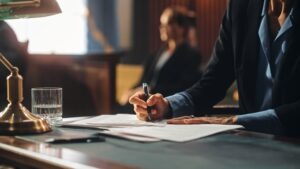
In Oklahoma, a premises liability lawsuit can originate because of a multitude of reasons, but typically, lawsuits that become court cases all take a similar path, moving along the various phases of litigation. When the case is presented in a courtroom, it has its own distinct characteristics.
When a lawsuit becomes a court case, there are four phases of litigation. An Oklahoma Premises Liability Attorney can file motions and perform discovery. In the pre-trial stages, they will try to reach a proper settlement. If a settlement still cannot be reached, the case will go to trial. Appeals and collection efforts may follow a trial before the case is truly resolved.
The whole ordeal is one complicated litigation process after another. An experienced premises liability lawyer in Oklahoma can further explain the various litigation phases to the unfamiliar, and the skilled team at BDIW Law can manage your case from the initial consultation to the final drop of the gavel.
Phase One: Pre-Trial Negotiations and Filing the Lawsuit
During a civil litigation dispute in Oklahoma, the case is often negotiated in some way before legal representation participates. There are plenty of cases that require the involved parties to negotiate formally. Often, in pre-trial proceedings, state and federal courts require the opposing parties to attempt alternative resolutions like mediation or oral arguments.
At this stage of a court case, the plaintiff will consult with their Oklahoma premises liability attorney. The negotiating process is explained, and either a mediation statement is prepared or the lawsuit is initiated by filing a petition with the court. A petition leads to a process known as a summary of the facts.
A lawsuit comes from this complaint’s legal basis and a court’s general request action.
Our Team Is Here To Assist You Every Step Of The Way.
SPEAK TO AN ATTORNEY TODAYPhase Two: Post-Filing and Discovery
After the filing of a petition, a copy of the document is provided to the defendant. The defendant is required to either answer the petition or file other documents or motions with the court, like requesting the case be dismissed.
In the post-filing phase, the discovery process can start with each party requesting documents and information pertaining to the case. Their respected attorneys can discuss and argue over which information they are obliged to turn over to the opposing parties. A hearing is held so the court can determine the case’s parameters of discovery.
This phase is also the time for each party’s legal counsel to issue subpoenas to people or businesses to obtain more information regarding the case. Depositions are taken to get witness accounts or for them to answer various questions under oath. A court reporter will transcribe and record all of this information. In some cases, a videographer may record the depositions.
Phase Three: Summary Judgment and Trial
Once discovery is completed, the plaintiff or defendant can file a motion for summary judgment. This is a motion asking the court to enter judgment before the case goes to trial. A motion for summary judgment can only happen when the case’s facts are not disputed and one of the parties is clearly entitled to relief. Judgment for relief can either be granted to the plaintiff or the defendant, depending on the strength of each party’s case.
If all the claims receive a summary judgment, the case stops at the trial court level. Before continuing to a trial, most state and federal courts require both parties to make a concerted effort to agree on a settlement. These attempts happen in mediation or settlement conferences.
Before mediation, both parties send a statement explaining their side of the case to a mediator. The parties and their premises liability attorneys meet to try to reach an agreement so the case can be settled and resolved. If a settlement is not reached, the case goes to trial.
Trial
During the trial, the plaintiff and defendant come together with legal representation in a courtroom to present their case to a judge or jury. The proceedings usually look like this:
- Opening statements are delivered
- Witnesses are called
- Evidence is presented
- Closing arguments are delivered
- The jury is instructed by the court
- The jury deliberates and reaches a verdict favoring one party
If the case is presented and tried by a judge only, they can make a ruling after closing arguments. In some cases, a judge may take the matter under advisement, and a written ruling will be issued later.
Phase Four: Post-Trial and Possible Appeals
It does not matter if the case was resolved with a summary judgment or a judge or jury’s verdict, both parties have the option to take certain actions once a judgment has been recorded by a court. These actions include:
- File a motion requesting for new trial
- Appealing to the Oklahoma Supreme Court
Appeals
If a defendant appeals and the court rejects the case, the plaintiff is free to collect on the judgment. If a negligent party does not pay or is unable to pay, the defendant can take steps with the court to arrange collection of the judgment. A court can take several actions to ensure compensation is paid, including:
- Setting up payment plans
- Garnishing the plaintiff’s wages
- Using a court order to sell the plaintiff’s property
Once all outstanding debts of the judgment are satisfied and the appellate procedures are exhausted, the case is considered closed.
Contact an Oklahoma Premises Liability Attorney Today
The litigation of a premises liability case can be an overwhelming endeavor. Frustration can set in when it feels like justice is spinning its wheels but going nowhere. An experienced Oklahoma premises liability lawyer can explain what to expect. The skilled team at BDIW Law can manage your case with compassion and tact.
Leave the matters of litigation to a premises liability attorney in Oklahoma. If handled correctly, the complexities of a premises liability case can be simplified, and the damages determined. Skilled legal representation can move these types of cases through the various stages of litigation to the compensation awarded that is needed to recover from your injuries.
If you or a loved one has been injured due to a property owner’s negligence, contact us for a free consultation.








